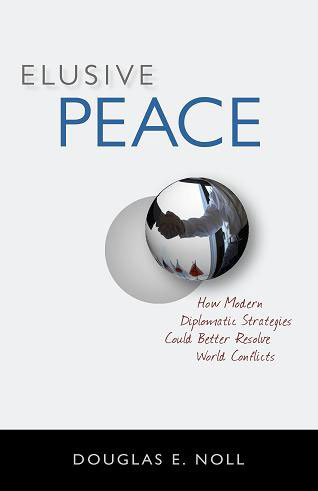Libya needs a new diplomacy; not the tired, ineffective efforts of the modern diplomatic establishment. Here’s why.
First, Gaddaffi is exhibiting the classic signs of the third phase of The Dollar Auction Game, a phenomenon well-known to conflict resolution theorists and practitioners, but absent from the lexicon of diplomats. Speaking from his hiding place, believed to be in southern Libya, he said on Thursday Libya’s “armed tribes” were still loyal to him and would fight on and expel the “colonisers”. “We will not surrender,” he said. “We are not women and we are going to keep on fighting. “If they want a long battle, let it be long. If Libya burns, who can govern it? So let it burn.” (The Telegraph, September 1, 2011)The Dollar Auction Game was invented by some theorists at the RAND Corporation back in the 1950s. Essentially, the game goes like this: The auctioneer offers up a $5 bill for sale. The rule is simple. The highest bidder wins the $5 for the highest bid and the second highest bidder, the loser, has to pay whatever his or her bid was to the auctioneer. I have conducted this game dozens of times with predictable results. The most memorable example was at a bankers’ convention. The two hundred or so people in the room were all lenders responsible for loans ranging from $10 million to $50 million.
The auction began at 50 cents, and various bankers began bidding. At first, the attitude was “Hey, this is cheap. Maybe I can make a quick profit.” Of course, everyone else in the room is thinking the same thing, and the price drives upwards. At around $3, the attitude changes from “This is a good deal” to “I want to win.” The auction is now a game to be won or lost. Eventually, as is almost always the case, the auction came down to two bidders. One was at $4.95, the other was at $4.99. The lower bidder went to $5. The game just changed again. Now, it was no longer a competition, it was “I know I am going down, and I am taking you with me.” In that auction, I stopped the bidding at $20. I have of other auctions going into the thousands of dollars. The Dollar Auction Game points out how emotions drive conflicts. Diplomacy is based on the assumption of rationality. However, rationality is the first thing to go out the window when people get into conflicts. Diplomats generally have no clue how to deal with the deep, intractable emotions in difficult conflicts, and therefore ascribe emotional conflict behaviors to “irrationalism.” At that point, they wring their hands and call in the military. In this case, the world diplomats are talking about a UN military presence in Libya to deal with Gaddaffi’s dollar auction situation. What they are not doing is thinking about Gaddaffi’s psychology and developing processes for engaging him at a level that will de-escalate rather than inflame violence. Second, while fighting has died down in Tripoli, life there remains very difficult. The Tripoli Post reported on Wednesday that much of the capital is without electricity and water. The pumps used to pump water from the man-made river to the reservoirs were not working because of the lack of electricity and the reservoirs were empty. Though a cleaning campaign has started, some streets in Tripoli are strewn with torched cars and stinking garbage because trash had not been collected for months. Stores are closed, bombed planes sit on the Tripoli’s airport’s tarmac, and corpses crowd abandoned hospitals, though mass burials have been started. To make matters worse, fuel prices have skyrocketed with the cost for a gallon fetching 28 times the normal price before fighting broke out. (The Tripoli Post, Friday, August 28, 2011) As I have pointed in earlier blogs, the first priority of the National Transitional Council must be to get basic services back into the cities, including clean water, electricity, sewage, and sanitation. It recognizes this need and is asking for patience from the Libyan people. This is good. At the same time, representatives of some 60 nations gathered in Paris Thursday at a Friends of Libya conference, aimed at helping the new Libyan authorities restore stability and a functioning economy to a country ravaged by rebellion and 42 years of dictatorship. Libya was represented by the two leaders of the rebels’ Transitional National Council — its chairman, Mustafa Abdel-Jalil, and its prime minister, Mahmoud Jibril — who laid out the new government’s need for reconstruction aid and technical assistance. This was the classic, how-to-do-it diplomatic gathering. Speeches were given and sort of listened to. There was very little in the way of decision-making, and the likelihood of a rapid diplomatic response to the Libyan situation seems slim, next to zero. Even Secretary of State Clinton, who was present, offered nothing more than broad platitudes of support by the US.(New York Times, September 1, 2011) What is happening is classic diplomatic failure. The international community supported an external military intervention in support of the rebels. For the 7 months of the campaign, no one apparently gave much strategic thought to what will be needed once Gaddaffi is tossed out. No one began the serious, difficult tactical planning for food, fuel, expertise, and logistical support necessary to get Libyans back to a semblance of normality while the National Transitional Council focuses on creating a new Libyan constitution and representative form of governance. Instead, at the end of the major offensive effort, they gather in Paris, not Tripoli, to debate, not act. They wish to avoid the debacle of Iraq, but lack the initiative of bold action to support the Libyan people. What would a new diplomacy look like? First, the assumptions of rationality around human decision making would be given proper weight. Which is to say, not much. Second, before anyone fired a cruise missile in February, a planning task force would have been convened to plan for the logistics of a post-Gaddaffi regime. Right now, there should be tankers and freighters off the coast of Tripoli filled with fuel, supplies, and support personnel to help the Libyans reconstruct their country. Because of the attitudes of the old diplomacy, it may be weeks or months before this happens. In the meantime, Libya will hang on the cusp of transformation or anarchy. Is this any way to run a modern world? The lesson here is that the old ways are not working. While the international community wants to avoid another Iraq, its behaviors, attitudes, and inaction virtually guarantee further turmoil and humanitarian disaster for the long-suffering Libyans. Douglas E. Noll, Lawyer Turned Peacemaker, is author of Elusive Peace: How Modern Diplomatic Strategies Could Better Resolve World Conflicts (Prometheus Books, 2011).


